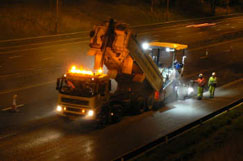National Highways is currently revising its construction standards, which has prompted internal struggles over how best to bring the innovation into specifications and standards,a director has revealed.
Dr Joanna White (pictured), roads development director at National Highways, said she had battled to bring the results of trials to market, colleagues fell back on the idea that they had 'always done it this way', and that it was 'what the contract allows'.

‘We have developed digital online authoring software and the key thing for me is being agile so we can get the innovations into our standards and specifications as quickly as possible so they can be deployed. The other thing is leadership and demonstrating to our colleagues in National Highways that this is a way of doing things.
'In some of the conversations I have had, people always fall back to, "I have always done it this way, this is what the contract allows".
‘For me, there is a lot about making sure our standards are updated and working with our commercial and procurement colleagues, making sure our contracts are flexible enough to incorporate our innovations. We are not quite there yet, but it is definitely something I recognise we do need to spend a bit of time on.'
Dr White suggested one such innovation could come from the results of an intelligent compaction trial carried out on the A303 in September.
‘[The system] can automatically read the level of compaction as it goes over the service and it can work out when it needs to go back to redo it and get the level that is required from our standards. It can reduce what is normally eight passes down to a maximum of two. So there are obviously efficiency and safety improvements.
'Now we just have to make sure our standards and specifications enable that to be used on a regular basis.'
Highways understands that elements of intelligent road laying have already been incorporated into contracts on the Scottish trunk road.































